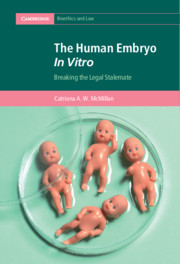Book contents
- The Human Embryo In Vitro
- Cambridge Bioethics and Law
- The Human Embryo In Vitro
- Copyright page
- Dedication
- Contents
- Foreword
- Acknowledgements
- Table of Cases
- Table of Legislation
- Abbreviations
- Introduction
- Part I Into Liminality
- Part II Through Liminality
- Part III Out of Liminality
- 6 A Context-Based Approach
- 7 Looking Forward
- Conclusion
- Bibliography
- Index
7 - Looking Forward
The Fourteen-Day Rule, In Vitro Gametogenesis, and Ectogenesis
from Part III - Out of Liminality
Published online by Cambridge University Press: 18 March 2021
- The Human Embryo In Vitro
- Cambridge Bioethics and Law
- The Human Embryo In Vitro
- Copyright page
- Dedication
- Contents
- Foreword
- Acknowledgements
- Table of Cases
- Table of Legislation
- Abbreviations
- Introduction
- Part I Into Liminality
- Part II Through Liminality
- Part III Out of Liminality
- 6 A Context-Based Approach
- 7 Looking Forward
- Conclusion
- Bibliography
- Index
Summary
This chapter considers how a liminal lens help inform contemporary discussions surrounding embryos in vitro and beyond using three case studies: 1) the 14-day rule, 2) in vitro gametogenesis, and 3) ectogenesis. The first case study is important as it is the principal manifestation of law’s attempt to reflect ‘special status’ on the embryo, and because it is also an example of legal attempts to deal with embryonic processes. This example is used to examine what the context-based approach developed in this book could bring to contemporary debate about the nature of such a rule, as well as its retention, reduction, or extinction. The second example enables us to consider what the analysis offered in this book says about these relatively new technologies in relation to their regulation, and the key biological and legal thresholds involved. The final case study focuses specifically on partial ectogenesis, a technology which not only introduces new thresholds, but leads us to question our existing understanding of meaningful legal thresholds, most notably birth as the moment in which the foetus/baby attains personhood. By these means, the analysis engages with the entire trajectory of embryonic development as this is driven by scientific possibilities, both current and near future.
Keywords
- Type
- Chapter
- Information
- The Human Embryo In VitroBreaking the Legal Stalemate, pp. 178 - 205Publisher: Cambridge University PressPrint publication year: 2021

